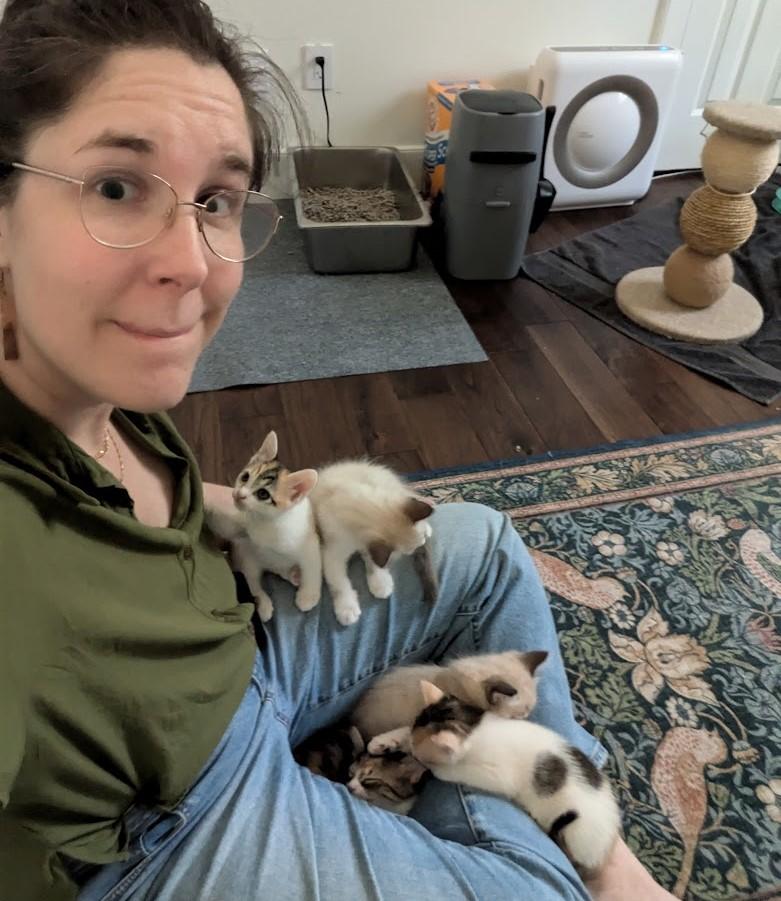OVPR Staff Profile: Research Development Officer Kim Jennings

This month we get to know Kim Jennings, our research development officer for biomedical and health sciences — and resident kitten lady. She explains how she helps UT researchers compete for external funding, why expertise in rodents’ neural circuitry sort of but doesn’t really prepare one for research development, and what makes her husband’s fried eggs her favorite meal in the world.
What does your job entail as the research development officer for biomedical and health sciences? How long have you been in that role?
As an RDO, I'm basically a Swiss Army knife for helping researchers compete for external funding to accomplish their work. My role encompasses team-building, advising on content, critical reading, skills training — basically anything we need to do to build UT's capacity for doing research (which requires getting grants). I've been in the role almost three years.
How long have you been at UT Austin?
I did my bachelor’s at UT (psychology, graduated 2011), but I have only worked here since 2022. I started directly in OVPR.
What is your favorite thing about your job? Any big surprises?
This role is really fulfilling; I get a lot out of being helpful and guiding our "clients" — i.e., our researchers — through the thorny proposal development process. It's a team effort, and RDOs bring a skillset that is deeply appreciated by principal investigators (PIs). Before I started this job, I think I assumed senior PIs had it all figured out. Not true!
I see that you earned a Ph.D. in neuroscience from Berkeley. What, in particular, did you study? Did it help prepare you for your current role at all?
I studied the neural circuits of innate social behavior — things like parental behavior, mating or aggression that all mammals are hard-wired to do — with a heavy emphasis on how these circuits are influenced by hormones. I'd like to say it helped me understand human behavior better, but unfortunately mouse behavior doesn't always transfer 1:1.
However, the resourcefulness I developed designing and implementing novel experiments has served me well in my role now — for example, being comfortable figuring things out on the fly.
What brought you back to Austin? What do you like most about it?
My and my husband's families are all in Texas, so we knew we wanted to "come home" from California after my postdoc and set down roots. I love Austin's medium-sized city vibes: plenty to do, lots of character, but small enough that you can actually get to know most of it. I also enjoy that it is far enough away from my parents in Houston that they don't "pop by" unannounced. 😋
I know from that time I heard all the mews coming your office that you foster kittens from time to time. What’s that like?
I do foster cats and sometimes kittens, in addition to having two 12-year-old cats of our own! It's something I've always wanted to do but never did until moving back to Austin.
We foster through Austin Pets Alive, which takes in a lot of medical-needs pets from Austin Animal Center and from Texas’ high-kill shelters. Since we have a quiet house with space, we focus on cats that are super stressed in the shelter, usually older cats or nursing moms. We give them space to feel safe again so they can get healthy and then adopted! My biomed background comes in handy — I'm very comfortable giving medications and doing wound care!
And finally, most important: If you had to eat one meal for the rest of your life, what would it be and why?
I eat the same thing for breakfast six to seven days a week, so probably that. Every morning, my husband makes us fried eggs with cheese on homemade English muffin bread, and I douse mine in sriracha. In exchange, I make coffee and feed the cats. 🙂 It's always delicious, probably extra so because I don't have to cook it!

